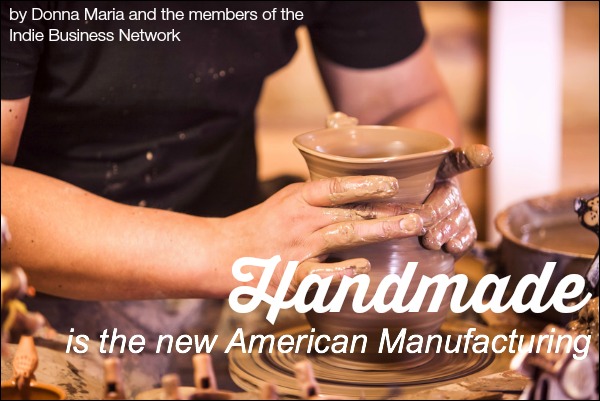Everywhere we look these days, we see stories about the state of American manufacturing. Some say it's dead. Some say it's dying. Some say it's alive and well. None of the stories account for the growth in the number of people making products with their hands and selling them to the public as a business — not a hobby.

I call these people Handmade Entrepreneurs, and I believe they are the new face of American Manufacturing.
Handmade Entrepreneurs Are More Than Makers
Sometimes, people who make the products they sell are called Makers. This is a good term, but since it is also used to describe people who make things for fun and personal enjoyment, it's not the best term to describe people who create things every day with the singular goal of selling them at a profit and building a sustainable business.
Handmade Entrepreneurs Act Locally and Think Globally
Handmade Entrepreneurs make products in a specific physical location, but they don't always sell them that way. In addition to local farmer's markets, Handmade Entrepreneurs sell their products at trade shows, gift shows and at their websites. They also sell them at other people's websites, including sites like ArtFire, Etsy and OpenSky, and also at sites owned by their Handmade Entrepreneur colleagues. (Our members do a lot of this!)
Handmade Entrepreneurs Support Local Economies
Farmer's markets are a major sales venue for Handmade Entrepreneurs. They sell all kinds of products, including candles, soap, perfume, clay pots, paper products, jewelry, garlic, bacon, jams, breads and peaches. Farmer's markets play a large role in sustaining Handmade Entrepreneurs, and that role is growing.
According to The Economic Impact of Farmer's Markets: A Study of 9 Markets in 3 Major U.S. Cities, a 2012 report issued by Market Umbrella, a farmers market think tank, farmer's markets and the people who sell there make substantial contributions to local economies. Here are some numbers from the report:
• Annual Economic Impact on Vendors: $52,000–$40,594,000 per market
• Annual Economic Impact on Nearby Businesses: $19,900–$15,765,700 per market
• Annual Economic Impact on the Community: $72,000–$56,360,000 per market
These numbers are not huge individually. But multiply them across thousands of towns and millions of people across America, and the impact is staggering.
Handmade Entrepreneurs Take Their Businesses Seriously
How do I know?
Because I serve them every day. I watch the constantly. I coach and mentor them. They are my friends. I asked some Handmade Entrepreneurs who are IBN members to describe how they approach their businesses – as hobbies or as serious business ventures. Here is what they told me.
Stephanie Greenwood at Bubble and Bee Organic in Bountiful, Utah said
“Our business is everything. It is both my partner's and my full-time job, and we employ 7 people full-time and one person part-time. We are always working to expand, innovate, and grow. We want to grow this to be a multi-million dollar enterprise.”
Like Stephanie and Bubble and Bee on Facebook
Deb Jasien at Fields of Ambrosia in North Conway, New Hampshire said said
“I started out as a hobbyist back in 1998…wanting to put my flower and herb gardens to work for me in more than beautiful arrangements and cooking. I was happily crafting soaps and bath salts for myself, friends and family until my younger sister was diagnosed with lung cancer in the fall of 2000. I got serious and began learning more about essential oils and herbalism to try and find remedies to ease her mind and body through her treatments.
When we lost her in March of 2001, I decided to take my new found knowledge, and the products I made for her, to the next level – incorporation and a full-time business that has been growing ever since. From my farmhouse kitchen, to a studio in the barn, to our first tiny retail space and finally to my current facility in a classic New England Main Street storefront that includes my retail space, custom perfume business – AROMA, manufacturing, storage and shipping.
We are definitely serious about our business! And I still have as much fun as when it was just a hobby'!”
Like Deb and Fields of Ambrosia on Facebook
Roslyne Johnson of MayaIndia in Hempstead, New York said
“I take my business seriously, although currently employed full time. I am blessed to be able to fund my business with my income, eliminating the need for bank loans. I will say though, sometimes my job gets in the way of my business- but I keep moving forward.”
Like Roslyne and MayaIndia on Facebook
Dominique Harris of All Things O Natural in Atlanta, Georgia said
“I turned down a recent opportunity to return to the Interior Design field to manage another Interior Design Gallery and passed along an awesome freelance design customer to a friend. My husband left his career in restaurant management to invest full time in our business. We home school our four kids so that we can be flexible to travel to shows if need be. We're pretty serious.
We're constantly strategizing on our future vision for our company. Investing, strategizing, seeking out business consultation to help us continue to move forward, visualizing and goal setting moves this wayyy beyond the world of hobby.”
Like Dominique and All Things O Natural on Facebook
Kirsten Connor at Flourish Body Care in Woodstock, Vermont said
“In 2003 I used all of the money from my divorce settlement to move to Vermont with my 3 young (under age 8) children with the idea to teach myself to make soap and open a shop. I was an only parent and didn't feel I could teach kindergarten anymore and give my kids the attention they needed and I wanted to do something creative. I very quickly realized I would have to learn to make more than just soap to pay the rent and have money to live.
I grew that business to having a retail store, providing an amenity line to local hotels and some wholesale accounts and renting a 3,000 square foot workshop. When the economy turned I decided to get out of the retail end and focus on wholesale and downsized my workshop by purchasing a duplex farm house(one side for making product).
We launched, got a bunch of accounts-including Whole Foods and then lost our house and our business under 5 feet of water in Hurricane Irene in 2011. We've taken out mega loans to rebuild our house and our business because we are SERIOUS.”
Like Kirsten and Flourish Body Care on Facebook
Christy Rose at KB Shimmer in Terra Haute, Indiana said
“Don’t get me wrong, years ago, I thought I took my business seriously; I paid my taxes, bought insurance, and followed the rules, and had a grand old time playing with new supplies, working on my DIY website, and heading out to shows. Money made was a bonus, and I was happy if I broke even on my taxes each year.
Then, I lost my job, and started to really push the business. I went after a few wholesale accounts, listed more online, and did what I could to bring in money. I thought I was serious then, but I also had a backup; my husband had a good paying job that paid the bills; my income was play money, but I worked hard and the business was growing rapidly.
On December 15th, 2012 my husband came home and told me he quit his job to work on the business full time. It should not have been a surprise, I was already working 18 hour days on KBShimmer, and my husband spent nights and weekends helping me. We even had our 8 year old daughter helping when needed.
But at that moment, I realized that my business was now supporting our family, paying our mortgage, and keeping my daughter happy and healthy, and things got a lot more serious.
We had to make a business plan. How could we grow the company to the next level? How could we reduce costs, improve shopping experiences for our customers, and get more orders coming in? When I had semi’s dropping off pallets of ingredients to my house, I knew that getting serious meant we needed to move out of the house and into a separate location where lack of space did not hinder growth. I also needed to stop thinking I had to do everything myself; a smart business owner can identify weaknesses and surround themselves with people that have those strengths.
That mindset allowed us to feel good hiring an accountant, a PR agent to help get our name out there, and web designer to revamp our site. We now have three employees beyond the two of us, and hope to add another next year. By getting real, and separating KBShimmer from myself, thinking of it as a business, not a hobby, has allowed us to really grow. Today, we just finished doubling the size of our warehouse and sales have never been better. I hope that by the end of the year we hit 7 figures in sales. Getting serious to me was a process, but one well worth it.”
Like Christy and KB Shimmer Facebook
Donna DeRosa of Donna DeRosa Coaching in Redondo Beach, California said
“I thought I was serious about my handmade business for a few years. It took a long time to admit to myself that I was really a hobbyist. It’s not an easy decision. But one day an Etsy sale alert went off on my phone and I actually said out loud, “Oh man, now I have to make soap.'
Then I thought, ‘uhoh.' That’s when I had to really take a hard look at what I was doing. It was fun for me when it was a hobby, but trying to make it into a business wasn’t right for me. And whenever I participated in things like the Indie TweetChat or other events, I realized people wanted other things from me, like advice or my know-how in other areas, not really my bath products.
Long story short, that’s partly how I found my way to coaching. I get to help people and I’m really happy now. Everything I’ve learned in my past is finally coming together. Sometimes your dreams change and refine themselves into something better for you. I am definitely serious about my coaching.”
Like Donna DeRosa Coaching on Facebook
Roberta Perry of Scrubz Body in Bethpage, New York said
“Since 2006, from kitchen table to converted garage, to 850 square feet of space to our present 1,400 square foot space, I live, eat and breathe this business. It's the most fun, rewarding, exciting and loving way to spend my ‘working' hours.”
Like Roberta and Scrubz Body on Facebook
Pamela Jenkins of Koils By Nature in Stone Mountain, Georgia
“I quit my good government job as a computer engineer to live my dream! Koils by Nature was always a business and never a hobby, so I had to make tough decisions to be able to support my family. Saying ‘NO' is easy when you're running a business! My husband helps me make products in the business. He has a full-time job (but he works from home), so he comes to the office with me twice a week to do his tasks.”
Like Pamela and Koils By Nature on Facebook
Rachael Pontillo of Holistically Haute in Flourtown, Pennsylvania said
“I definitely take it seriously. My goal is for my business to replace my husband's income completely so he can quit his high-stress job and we can run it as a family business and teach our kids about entrepreneurship from an early age rather than letting them earn minimum wage at some store or restaurant.”
Follow Rachael and Holistically Haute on Facebook
Too Many Stories To Tell!
As you can see, these situations are not freaks of nature. They are not flukes. They are not clustered in poor neighborhoods or states. They are not clustered in wealthy neighborhoods or states. They are not black or white, or yellow or brown.
Only a few of them were raised by entrepreneurs. They are not all selling the same type of product or service. They don't have a bunch of fancy degrees, and they didn't go to school to learn how to be business owners.
They figured it out, plain and simple. And they are fast becoming then norm and not the exception.
For the most part, President Obama and our lawmakers and not thinking about Handmade Entrepreneurs when they talk about “small business.” I think that is poised to change and IBN members are part of the reason why.
“Is Handmade the new American Manufacturing? Or am I delusional? What do you think?
Best and Success!
![]()



